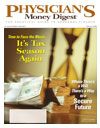Publication
Article
Physician's Money Digest
Estate Tax Tactics for Noncitizen Spouses
Many non-US citizens choose to liveand work in the Land of Opportunity,where they marry a citizen and establisha life together. Living in America as a permanentUS resident (or "resident alien")means that the federal estate tax lawsthat govern American citizens apply.According to Tax Savings Report, if a permanentUS resident or citizen dies withan estate over the current estate taxexemption—$2 million for 2006—theremaining estate is subject to a 45% taxrate, even if the assets are outside of theUnited States. (The federal estate taxonly applies to assets within this countryfor nonresident citizens.) Estate-planningtactics can minimize taxes bybequeathing assets to children andgrandchildren either directly or throughtrusts, but what happens to a survivingspouse? The unlimited marital deductionprivilege allows US citizens to receiveunlimited assets from their noncitizendecedent spouse through a tax-freetransfer of wealth. However, noncitizenspouses cannot avoid federal estatetaxes when their spouse passes becausethe unlimited marital deduction is notapplicable. For example, a spouse, who isa US citizen, dies and leaves an estateworth $2.5 million, of which $500,000goes to the noncitizen spouse and theremainder to grandchildren. The survivingspouse's estate tax bill is $230,000—that's 46% of the $500,000 over the $2-million exemption. Surviving noncitizenspouses can avoid federal estate taxes ifthey become a US citizen no later thanthe tax filing date, which is usually 9months after death. Another solution isto set up a qualified domestic trust(QDOT), which defers the federal estatetax owed by a noncitizen spouse untilassets are withdrawn or the spouse dies.While a QDOT does not reduce taxes, itcan function as a holding account until asurviving spouse becomes a citizen, atwhich time any estate taxes become nulland void.
